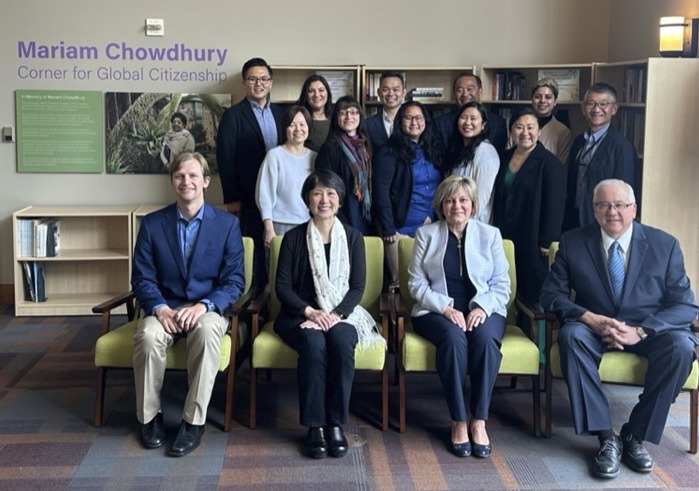Soka University of America Unveils the Mariam Chowdhury Corner for Global Citizenship

Soka University of America unveiled the Mariam Chowdhury Corner for Global Citizenship on May 27 at a ceremony honoring the legacy and contributions of Mrs. Chowdhury. The beloved life partner of Ambassador Anwarul K. Chowdhury, Mrs. Chowdhury was a friend and supporter of SUA, accompanying the ambassador to campus over the last two decades to support SUA’s learning clusters and dialogues on the culture of peace.
“Nothing gives me greater pleasure than to open the Mariam Chowdhury Corner honoring her great memory here in the residence hall where she stayed during her visits to SUA,” said SUA President Edward Feasel. “I know Mrs. Chowdhury would be so happy that students will be able to use and be inspired by this new Corner for Global Citizenship at the university she loved so much and had such great expectations for.”
The Chowdhurys resided in Abeona Hall 305 during their time on campus, actively engaging with the community and hosting informal gatherings and dinners for students. Aaron Kuyper ’19, Yumi Masui Reker ’08, and Astrid Dorantes ’11 spoke at the ceremony, sharing warm memories of their time spent with the Chowdhurys on campus. Reflecting on Mrs. Chowdhury’s impact on his life, Kuyper said, “The best thing we can do to honor her memory is to carry on her example to others we encounter, to be unerringly curious, kind, and strong even in the face of pain and adversity. This spirit of passing along the chain of love and kindness—this is the fabric for the culture of peace.”
The Mariam Chowdhury Corner for Global Citizenship features a thoughtfully curated library and a comfortably furnished space for students to study and engage in dialogue. The plaque memorializing the corner reads in part:
Mrs. Chowdhury embraced SUA as her family, extending love and care to its students, its faculty, its support staff and the broader community members. She loved everybody spontaneously and unconditionally. She cherished immensely the love, care, and respect she received from all at SUA.
Mrs. Chowdhury’s support for Ambassador Chowdhury never wavered as he pursued his life’s work of contributing to the practice of the culture of peace and nonviolence. Soon after assuming his position as Bangladesh ambassador to the U.N., he initiated a proposal in a letter to U.N. Secretary-General Kofi Annan that the U.N. General Assembly develop a specific agenda on the culture of peace. He chaired negotiations among U.N. member states that culminated in the adoption of the 1999 Landmark Declaration and Programme of Action on a Culture of Peace. He also initiated the proclamation of the “International Decade for Culture of Peace and Nonviolence for the Children of the World (2001-2010).” Both were adopted by the General Assembly. Ambassador Chowdhury has also been a strong and widely respected advocate for the equality of women and women’s rights throughout his career.
The international scope of the Chowdhurys’ contributions is reflected in the outpouring of support for the opening of the Mariam Chowdhury Corner for Global Citizenship. Ambassador Neville Gertze, permanent representative of Namibia to the U.N. and president of the International Association of Permanent Representatives, which encompasses a global membership of nearly 300 former and current ambassadors to the United Nations, sent a congratulatory message to Ambassador Chowdhury and SUA. Ambassador Gertze expressed his wish that the new corner instills “new resolve in all of us to commit to leave no one behind in the interest and for the betterment of humanity and planet.”
Dr. Dorothy Maver, founding president of National Peace Academy, shared in a congratulatory message her belief that Mrs. Chowdhury would be honored by the new corner that bears her name. “Her legacy will serve so many students,” Dr. Maver said, “and I recall how she spoke of them and how they were inspired by her presence as she lifted them with her love and confidence in their capacity to make a difference in this world.”
President Feasel recalled the relationship Mrs. Chowdhury and Ambassador Chowdhury developed with SUA founder Daisaku Ikeda over the years based on their shared vision and commitment to peace, culture, and education. He said that whenever he thinks of Mr. Ikeda, the image of his wife, Kaneko, always by his side, also comes to mind.
“Similarly, for us, Mrs. Chowdhury was always by Ambassador Chowdhury’s side, not only as his partner in life, but as an equal advocate and leader for the culture of peace,” President Feasel said. “She was Ambassador Chowdhury’s greatest supporter, but also shared honestly her opinions where she thought it would be helpful. Their relationship was one of love and shared mission that inspired our entire SUA community.”
